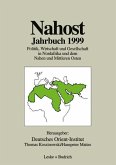With the ending of global strategic confrontation between superpowers, those in the Middle East must adjust to a new reality: to accept final responsibility for their own affairs, to make and recognize their mistakes, and to accept the consequences. In The End of Modern History in the Middle East, Bernard Lewis discusses the future of the region in this new, postimperialist era. For each and every country and for the region as a whole, he explains, there is a range of alternative futures: at one end, cooperation and progress; at the other, a vicious circle of poverty and ignorance.
The author examines in detail the issues most critical to the region's future. He describes oil as the current, most important export to the outside world from the Middle East but warns that technology will eventually make it obsolete, leaving those who depend solely on oil revenues with a bleak future. The three factors that could most help transform the Middle East, according to Lewis, are Turkey, Israel, and women. He also argues that there is enough in the traditional culture of Islam on the one hand and the modern experience of the Muslim peoples on the other to provide the basis for an advance toward freedom in the true sense of that word and to achieve the social, cultural, and scientific changes necessary to bring the Middle East into line with the developed countries of both West and East.
The author examines in detail the issues most critical to the region's future. He describes oil as the current, most important export to the outside world from the Middle East but warns that technology will eventually make it obsolete, leaving those who depend solely on oil revenues with a bleak future. The three factors that could most help transform the Middle East, according to Lewis, are Turkey, Israel, and women. He also argues that there is enough in the traditional culture of Islam on the one hand and the modern experience of the Muslim peoples on the other to provide the basis for an advance toward freedom in the true sense of that word and to achieve the social, cultural, and scientific changes necessary to bring the Middle East into line with the developed countries of both West and East.

Bernard Lewis über das Ende
einer Epoche im Nahen Osten
Zweihundert Jahre lang rivalisierten erst die Europäer, dann Europäer und Amerikaner um Einfluss im Nahen Osten, bis das Ende des Kalten Krieges auch das imperiale Wetteifern beendete. Damit ende die moderne Geschichte der Region, behauptet der in Princeton lehrende Islamhistoriker Bernard Lewis, der an diesem Dienstag 95 Jahre alt wird, in seinem jüngsten Buch. Darin geht es um Propaganda, Revolten und Judenhass, um die Zukunft des Nahen Ostens und um historische Entwicklungslinien.
Am Anfang stand auch hier Napoleon, stand sein Ringen mit Admiral Nelson um Ägypten. Die Franzosen verloren, entscheidend aber war, dass ein modernes Heer das Land im Osmanenreich so leicht besiegen und regieren konnte. Im Kampf um Macht und Einfluss wechselten seither die Hauptspieler, bis die Kolonialmächte, Briten und Franzosen, die Region schließlich verlassen mussten. Eines Tages, so Lewis, mögen Historiker betonen, dass das, was Bonaparte und Nelson begannen, von den beiden Präsidenten George Bush und Michail Gorbatschow beendet wurde. Als Saddam Hussein 1990 Kuwait überfiel, schlüpften weder das Weiße Haus noch der Kreml in die alte imperiale Rolle. Bush wollte es nicht, Gorbatschow konnte es nicht mehr. Sein Reich zerfiel, sechs neue islamische Länder entstanden.
Im kurzen Jahrzehnt bis zum Millennium fiel Russland als Spieler aus, und Amerika wandte sich ab. Auswärtige Mächte mischten sich gelegentlich ein, erfüllten aber nicht die alte Vormachtrolle. Nun mussten die Menschen im Nahen Osten die volle Verantwortung für sich, ihre Fehler und ihren Raum übernehmen. Eine neue Ära begann. Nach den zweihundert Jahren freilich, in denen die Hauptbeschlüsse oft außerhalb fielen, finden Betreffende nicht leicht ihren Kompass. Im Grunde haben Islamisten wie Osama bin Laden Amerika und andere Demokratien durch Terroranschläge letztmalig in die Ereignisse im Nahen und Mittleren Osten hineingerissen.
Das provokante Buch war vor den jüngsten Revolten fertig, aber nichts scheint des Autors These mehr zu erhärten als der prodemokratische Frühling des Jahres 2011. Im Ringen um Freiheit scheint nun auch dort die Morgenröte der liberalen Globalära auf. Der Vorwurf, Amerika verfolge imperiale Ziele, geht fehl. Schwerer als politische Interventionen wiegt für Lewis die kulturelle Durchdringung: Die Kultur erblühe unabhängig von politischer Kontrolle und erfreue sich des globalen Radius, vom islamischen Iran bis zum kommunistischen China.
Die Popkultur ergreift nicht nur die Eliten, sondern alle. Jugendliche lieben sie, zumal sie Impulse gibt, Entrechtete wie Frauen zu befreien. Den Ideologen gilt sie als tödlich. Ayatollah Khomeini nannte Amerika den Großen Satan. Laut Koran ist dieser ein Verführer. Satan ist weder Eroberer noch Ausbeuter. Aber ein Verlocker, noch dazu, wenn er schmunzelt. Die amerikanische Popkultur bildet die jüngste Herausforderung. Was tun? Soll man diese imitieren, zuschneiden oder hart bekämpfen? Das Buch ist ein Lesegenuss, wobei sich die Region im Moment seines Erscheinens dramatisch verändert. Die Betroffenen beginnen, selbst ihre Geschicke zu gestalten. Was für eine Chance für sie; und eine Festgabe für den Vordenker Bernard Lewis. WOLFGANG G. SCHWANITZ
BERNARD LEWIS: The End of Modern History in the Middle East. Standford: Hoover Institution Press 2011, 188 S., 14,95 Euro.
Bernard Lewis Foto: AlbertoCristofari/laif
SZdigital: Alle Rechte vorbehalten - Süddeutsche Zeitung GmbH, München
Jegliche Veröffentlichung und nicht-private Nutzung exklusiv über www.sz-content.de








